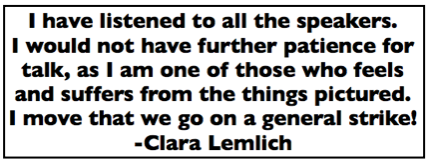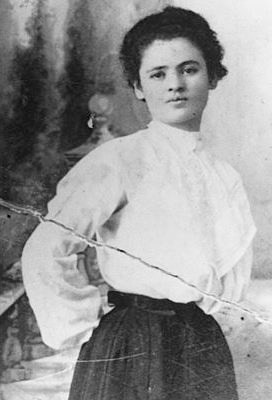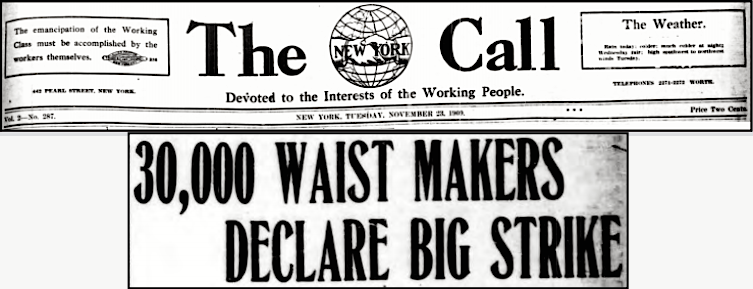 ———-
———-
Hellraisers Journal – Thursday November 25, 1909
New York, New York – Clara Lemlich Calls for General Strike of Waist Makers

“I want to say a few words.”
On Monday evening, November 22nd a mass meeting was held at Cooper Union Hall to consider the plight of New York’s waist makers, 70% of them young immigrant women. After listening through the long-winded speeches of the union leaders, a young garment worker arose from the crowd and demanded the opportunity to speak her mind. The New York Call of November 23rd describes the scene:
Clara Lemlich, who was badly beaten up by thugs during the strike in the shop of Louis Leiserson, interrupted Jacob Panken just as he started to speak, saying:
I want to say a few words.
Cries came from all parts of the hall, “Get up on the platform!” Wilting hands lifted the frail little girl, with flashing black eyes, to the stage, and she said simply:
I have listened to all the speakers. I would not have further patience for talk, as I am one of those who feels and suffers from the things pictured. I move that we go on a general strike!
As the tremulous voice of the girl died away, the audience rose en masse and cheered her to the echo. A grim sea of faces, with high purpose and resolve, they shouted and cheered the deliberation of war for living conditions hoarsely.
When Chairman Feigenbaum put Miss Lemlich’s motion to a vote there was a resounding roar of a yes throughout the hall, and once again the vast crowd broke into roars of applause. The demonstration lasted several minutes.
[Emphasis added.]
From The New York Call of November 23, 1909:
Reach Final Decision Amid Great
Enthusiasm at Four Meetings.
—–
GOMPERS MAKES SPEECH
—–
A. F. of L. President Says That Strike
Could No Longer Be Avoided.
—–Thirty thousand ladies’ waist makers, driven to desperation by the intolerable conditions prevailing in their trade, voted to go on a general strike last night at four enormous mass meetings which packed Cooper Union, Astoria Hall, Beethoven Hall and Manhattan Lyceum. For weeks these weary men and women, and 70 percent of them are women, debated the advisability of rebelling against long hours, low wages and brutal treatment at the hands of the bosses and their foremen, of pitting their numbers against the wealth of their masters. For weeks they weighed the awful trials of a strike in the balance against their present miserable lot, and unanimously they decided to strike.
The decision to strike was first reached at the Cooper Union meeting, which was addressed by Samuel Gompers, president of the A. F. of L.; Albert Abrahams, president of the Central Federated Union; W. A. Coakley, president of the Lithographic Helpers’ Union; Miss Mary E. Dreier, president of the Women’s Trade Union League; Jacob Panken, Meyer London and J. Goldstein.
In addition to the speakers named above, the following speakers addressed the Beethoven Hall., Manhattan Lyceum and Astoria Hall meetings: B. Frishwasser, Louis Weisglass, B. Weinstein, A. Miller, M. Podalsky, Louis Fishman, Charles Fromer, Salvatore Ninfo, Max Kazimirsky, Max Pine and Abe Baroff.
Gompers was given an ovation when he was introduced by Chairman B. Feigenbaum. The vast crowd rose to its feet and cheered him very enthusiastically for several minutes.
“A man would be less than human.” said Gompers, in opening, “if he were not impressed with your reception. I want you men and women not to give all your enthusiasm for a man, no matter who he may be I would prefer that you put all of your enthusiasm into your union and your cause.”
Continuing, Gompers said: “I have never declared a strike in all my life. I have done my share to prevent strikes, but there comes a time when not to strike is but to rivet the chains of slavery upon our wrists.”
Speaking of the possibility of a general strike, Gompers said, “Yes, Mr. Shirtwaist Manufacturer, it may be inconvenient for you if your boys and girls go out on strike, but there are things of more importance than your convenience and your profit. There is the lives of the boys and girls working in your business!
Appealing to the men and women to stand together, he declared: “If you had an organization before this, it would have stood there as a challenge to the employers who sought to impose such conditions as you bear.
“This is the time and the opportunity, and I doubt if you let it pass whether it can be created again in five or ten years, or a generation. I say, friends do not enter too hastily, but when you can’t get the manufacturers to give you what you want, then strike. And when you strike, let the manufacturers know that you are on strike.”
“I ask you to stand together,” said Gompers in conclusion, “To have faith in yourselves, to be true to your comrades. If you strike, be cool, calm collected and determined. Let your watchword be: Union and progress, and until then no surrender.”
This was greeted with a storm of applause.
Clara Lemlich, who was badly beaten up by thugs during the strike in the shop of Louis Leiserson, interrupted Jacob Panken just as he started to speak, saying:
I want to say a few words.
Cries came from all parts of the hall, “Get up on the platform!” Wilting hands lifted the frail little girl, with flashing black eyes, to the stage, and she said simply:
I have listened to all the speakers. I would not have further patience for talk, as I am one of those who feels and suffers from the things pictured. I move that we go on a general strike!
As the tremulous voice of the girl died away, the audience rose en masse and cheered her to the echo. A grim sea of faces, with high purpose and resolve, they shouted and cheered the deliberation of war for living conditions hoarsely.
When Chairman Feigenbaum put Miss Lemlich’s motion to a vote there was a resounding roar of a yes throughout the hall, and once again the vast crowd broke into roars of applause. The demonstration lasted several minutes.
A committee of fifteen girls led by one boy immediately left Cooper Union to carry the message to Beethoven Hall Manhattan Lyceum and Astoria Hall. The appearance of the committee at each point was the signal for a demonstration. The ratification the Cooper Union decision to go out on a general strike by the other meetings was in each case followed by a prolonged demonstration.
The following resolutions were unanimously adopted:
“Whereas, The Supreme Court of the District of Columbia has recently rendered a decision sentencing standard bearers of the A. F. of L. Samuel Gompers, John Mitchell and Frank Morrison; and
“Whereas, By this decision the Supreme Court went on record as suppressing free speech: therefore, be it
“Resolved, That we waist makers, assembled at Cooper Union, express our indignation against the sentence of Gompers, Mitchell and Morrison, and declare ourselves as favoring freedom.
A mass meeting of waist makers in Brownsville will be held in Metropolitan Saenger Hall, Pitkin avenue and Watkins street, tonight to ratify the decision of the Manhattan workers to go out on a general strike, and arrangements have been made for overflow meetings.
The following speakers have been announced to speak: Jacob Panken, J. Goldstein, A. Miller, B. Weinstein, Max Pine, A. Baroff and Charles Fromer. G. Genzeloff will preside.
———-
[Emphasis added.]
~~~~~~~~~~~~~~~~~~~~~~
SOURCE
The New York Call
(New York, New York)
-Nov 23, 1909
https://www.marxists.org/history/usa/pubs/the-new-york-call/1909/091123-newyorkcall-v02n287.pdf
IMAGE
Clara Lemlich
https://en.wikipedia.org/wiki/Clara_Lemlich
See also:
Uprising of 20,000
https://en.wikipedia.org/wiki/New_York_shirtwaist_strike_of_1909
Clara Lemlich
https://en.wikipedia.org/wiki/Clara_Lemlich
“For Hanukkah: The Ballad of Clara Lemlich”
-by Rabbi Brant Rosen
https://ynefesh.com/2016/12/22/for-hanukkah-the-ballad-of-clara-lemlich/
~~~~~~~~~~~~~~~~~~~~~~~~~~~~~~~~~~~~~~~~~~~~~
Clara Lemlich and The Garment Workers Rebellion – Leah Rubner
The Triangle Shirtwaist Fire Song – Mike Stout

